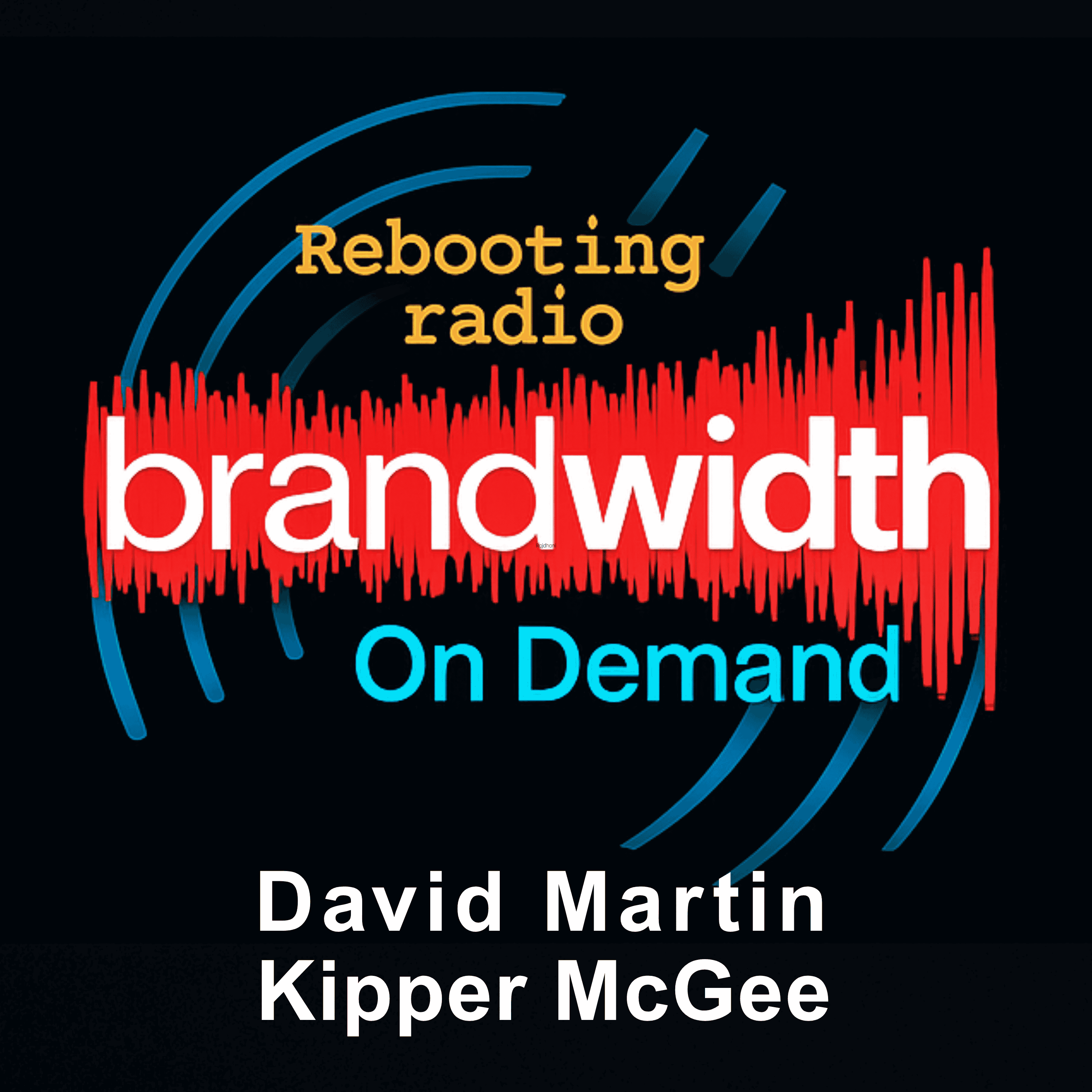Episode 171
Radio's Secret Sauce--Storytelling | Guest Toronto's Leading Talk Host Jerry Agar
Nothing brings radio to life like 'theater of the mind'. Yet the Art of Storytelling is often overlooked by radio and podcast hosts.
In this episode, Canada's leading talk host JERRY AGAR (based at CFRB NewsTalk 1010 in Toronto) shares some of the lessons learned after doing both music radio morning shows and years of talk radio including stints at Chicago powerhouses WLS and WGN, along with WABC/New York and others.
Key Takeaways You Won't Want to Miss:
(02:06) Jerry shares experiences from his days doing mornings on music stations to his transition to Talk -- and lessons learned along the way.
(03:09) One of the things that has made Jerry an international standout personality is his ability to make the listener FEEL what he's talking about -- especially working in a more tightly formatted music position.
(04:19) There are some or tips to help radio hosts get to the meat of the story and make the most of the time allotted. Jerry explains.
(06:12) Next to the payoff, perhaps the most critical part of telling a story is the setup. Jerry explains various ways of getting into a story.
(07:20) We also hear some signs of a really BAD Storyteller, and learn basic traps to avoid.
Check out ONE MINUTE MARTINIZING here
Please help us thank these supporters who help keep BRANDWIDTH ON DEMAND free!
Return to Brandwidth on Demand episode
YES! Send me the free SHOW NOTES preview email
Transcript
Here's the thing that had powerful impact on me, the late kid creditor, and
Jerry:out of all the days in all the sessions all those years ago, I remember this.
VO:Welcome to BRANDwidth on Demand, Your Guide to Rebooting Radio.
Jerry:He said he was doing okay in Dallas.
Jerry:Then he went to New York on vacation, went around the corner at a construction
Jerry:site and on a chain link fence, saw a dead man hanging upside down on the fence.
Jerry:And he came home and after a couple of days home, he realized, I've
Jerry:told that story to everyone I know, except my radio listeners.
Jerry:And it changed his career!
VO:BRANDwidth on Demand rebooting radio with a different take on all radio can.
VO:Now your guides through the Mediamorphosis, David Martin and
VO:author of the book BRANDwidth media branding Coach Kipper McGee.
Dave:This time, another episode of BRANDwidth Beyond Borders, to meet a
Dave:radio host who was born in Manitoba Woo, but has spent much of his career
Dave:in the US talk radio circuit After years of working in comedian music radio.
Dave:He moved to the US and became a talk radio host at W P T F
Dave:in Raleigh in the year 2000.
Dave:Subsequently, he's moved on to KMBZ Kansas City, both WLS-AM and WGN
Dave:in Chicago and WABC in New York.
Dave:He's filled in for network and satellite host, including G Gordon Liddy.
Dave:Mark Levin and on the Sun Radio.
Dave:In 2010, Jerry joined Toronto's CFRB for weekday mornings.
Dave:He's a regular columnist for the Toronto Sun as well.
Dave:He's also published op-ed pieces in various American newspapers.
Dave:Was a featured columnist for the Kansas City Business Magazine, along
Dave:with being named the multimedia fellow with the Illinois Policy Institute.
Dave:BRANDwidth on Demand is proud to welcome...well, he's a radio
Dave:renaissance guy, Jerry Agar.
Dave:Hey Jerry.
Kipper:Hey Jerry.
Jerry:One way of saying yeah, you got all didn't you?
Kipper:Hey, we're glad you're here.
Kipper:So for starters, Jerry, can you tell us about your transition from music to talk?
Kipper:And just how you got where you are right now.
Jerry:Well, I had spent an entire, seemed like a lifetime
Jerry:in smaller market morning radio.
Jerry:But I think the impetus for it was that one morning after the show in Knoxville,
Jerry:Tennessee got called into the program director's office and he said, Why were
Jerry:you talking about the school board?
Jerry:And I said, You know, there are a bunch of idiots.
Jerry:And he said, Well, they are a bunch of idiots, but that's not what we do, . And,
Jerry:and then after a pause, he said, You know, you probably would be able to do talk.
Jerry:. And that kind of put it in my head and, and I had become a fan of Rush, so it
Jerry:wasn't like I'd never heard of it before.
Jerry:Mm-hmm.
Jerry:and then they relieved me of my duties in Knoxville.
Jerry:And so I determined over the few months that they had to still pay me, that I
Jerry:would either get a talk radio job or I would quit the business altogether.
Jerry:Cause I was gonna age out of getting new morning shows, you know?
Jerry:And luckily I ended up in Raleigh and then I went Raleigh, Kansas
Jerry:City in Chicago to work with you.
Jerry:Kipper.
Jerry:Yeah.
Jerry:And the other things and, And you started thinking, I should have done this sooner.
Dave:Yeah.
Dave:Well, one of the things that's made you a real standout.
Dave:Internationally renowned is your ability to really tell a story to
Dave:make the listener feel what you're talking about, not just hear it.
Dave:And what are some of the elements of creating a story for radio
Dave:that you wanna pass on Jerry?
Jerry:I think that the first thing you have to understand is
Jerry:what is the point of this story?
Jerry:If you couldn't have the point of the story in one sentence in your
Jerry:head, the kind of thing you could use as a tease for the story, then
Jerry:you're not ready to tell the story.
Jerry:Most people can't tell a.
Jerry:But think about it, what's the first thing that happens in our lives once we
Jerry:start to be, you know, somewhat sentient?
Jerry:As little kids, we get hauled up on the lap of usually a parent or an
Jerry:older sibling, and they read us a book.
Jerry:They tell us a story, and radio, television, movies.
Jerry:Books, magazines, newspapers, it, we're being told stories all day long.
Jerry:And if you can stand out with your ability to tell somebody a story as opposed to
Jerry:just, I don't know, generic radio liners, you'll connect emotionally with the
Jerry:listener cuz we all want to hear a story
Kipper:spot on.
Kipper:So, in doing that question is, have you found any secrets or tips to help radio
Kipper:host get to that meat of the story to that one liner and clarify the moral or the
Kipper:message that goes with it and make the most of the time they have to tell it.
Kipper:Regardless
Jerry:of format, I think radio is a very emotional medium.
Jerry:And so what's the emotion that your story is trying to evoke?
Jerry:Are you trying to get people ticked off at a counselor or a government?
Jerry:Do you have a story that will make them ticked off?
Jerry:Are you trying to make somebody cry?
Jerry:Can you do that?
Jerry:Are you trying to make somebody laugh and you can make people laugh
Jerry:because you are, you're really funny.
Jerry:Or you can make people, uh, laugh in, in a different kind of way.
Jerry:Like they're, they're just amused the kind of way.
Jerry:I might tell you a story while we're sitting at the broad stop kiper,
Jerry:and I'll tell you something, and you don't fall off your chair laughing.
Jerry:You just kind of chuckle and it then, you know, it's the bonding
Jerry:exercise and so that bonding exercise can happen with listeners.
Jerry:In fact, here's the thing that had powerful impact on me.
Jerry:And it came from a guy maybe you guys know or know of the late kid crowd.
Jerry:Sure.
Jerry:And yeah, he was dominant in Dallas and he ran a morning show
Jerry:bootcamp thing I used to go to.
Jerry:And out of all the days and all the sessions all those years ago, I
Jerry:remember this, he said he was doing okay in Dallas and he would do what
Jerry:you would normally do on the radio, did entertainment, news, yada yada.
Jerry:Then he went to New York on vacation, went around the corner at a construction.
Jerry:On a chain link fence, saw a dead man hanging upside down on the
Jerry:fence, and he came home and after a couple of days home, he realized,
Jerry:I've told that story to everyone I know, except my radio listeners.
Jerry:He told his radio listeners and it changed his career because people
Jerry:don't care that Kim Kardashian and broke up with Pete Davidson.
Jerry:They don't go home to talk about that.
Jerry:But what would you tell your friends?
Jerry:Well then tell your listeners and they'll be your.
Dave:That's a great point, Jerry.
Dave:Now how do you set up a story or do you set it up?
Jerry:Sometimes I just say I did this three, four times
Jerry:this morning on my radio show.
Jerry:Let me tell you a.
Jerry:I like to say that cuz nobody goes, No, I don't wanna hear a story . Like,
Jerry:I don't think anybody says that.
Jerry:Now, if you get a reputation about being able to tell a story,
Jerry:you're not gonna last very long.
Jerry:But for me, oftentimes I didn't even plan to tell the story.
Jerry:One of the benefits of having been around for a couple of years is that, you know,
Jerry:a lot of things have happened to me.
Jerry:I've had a lot of experiences, I've had a lot of things collected in my.
Jerry:And I might be talking about a topic, talking to a guest, talking to a caller,
Jerry:and it sparks that little story in my mind that I think, uh, attaches to that.
Jerry:And then I might just, we, the science reporter on today, and I said to
Jerry:him, Let me tell you a story because it fit what we were talking about.
Jerry:I hadn't planned to say it.
Jerry:But he didn't.
Jerry:And uh, his response to it was very positive to the story he went, Oh yeah.
Jerry:And it became more of a conversation of a couple of buddies hanging
Jerry:out and one of 'em happens to know something about bats or whatever.
Jerry:He was talking about . Um, you know, you
Kipper:shared a lot of great tips on what it takes to tell a good story on
Kipper:Mike Handoff, but conversely, what are some of the characteristics of a really
Kipper:bad storyteller, and are there any ways that they can fix things or any
Kipper:tips on what they should try to avoid?
Kipper:Okay,
Jerry:so Kipper real quick, not gonna take too much of your time.
Jerry:I just want to tell you this story.
Jerry:See, this happened to me on thir, No, wait a minute.
Jerry:Maybe it was Wednesday, so it could have been Wednesday because
Jerry:I was shopping and normally I'd go.
Jerry:Who the hell parents get to the point.
Jerry:Yeah.
Jerry:Right.
Jerry:Like that's too much extraneous detail.
Jerry:I think if you're having trouble maybe focusing your stories, I would
Jerry:recommend actually do what they do in the editorial process in print.
Jerry:Take your story, take a recording of a story you told, actually transcribe it,
Jerry:and then sit there with the proverbial red pencil and say, What can I cut outta here?
Jerry:What could I cut out?
Jerry:And you might have told a story that's 300 words and find out
Jerry:you could have done it in 150.
Jerry:Mm-hmm.
Jerry:. And it'll be a better.
Jerry:Only the parts that make the story sing.
Jerry:That's all you need.
Jerry:Yeah.
Kipper:Twitter was a big help for all of
Jerry:us, I think.
Jerry:Yeah, right?
Jerry:Mm-hmm.
Jerry:, it was, you know, I write a newspaper column every week and I have a word limit,
Jerry:550 words, and invariably I'll write the column and I've got 750, 800 words.
Jerry:But I think what makes the column.
Jerry:Is that, then I gotta sit there and figure out how to say what I
Jerry:wanted to say in 200 fewer words.
Jerry:And when I do that, I go, Okay, that worked.
Jerry:And that's an exercise that helps me on the radio as well, I believe.
Jerry:Yeah.
Dave:We're with Jerry Agar from C frb Toronto.
Dave:Somebody you'd like to hear from.
Dave:What?
Dave:We'd love to hear your suggestions.
Dave:Email us show at brand with on-demand dot.
Dave:And
Kipper:now we've got a new way to stay in touch and for you to get in touch.
Kipper:We'd love to hear from you.
Kipper:Just follow brand width plus that's brand width.
Kipper:P L U S.
Kipper:One word we're on Facebook, Twitter, Insta, or
Jerry:LinkedIn.
Dave:Coming up, Jerry, share some things he knows now that
Dave:he really wishes he knew.
Dave:Way back when.
Dave:Hi, it's Gary
Jerry:Berkowitz, AC programing consultant at Berkowitz
Jerry:Broadcast Consulting in Detroit.
Jerry:Hey, it's Molly Cruz, brand manager for W M Y X N W XSS fm,
Jerry:here in Milwaukee, Wisconsin.
Jerry:I, this is Jake Neman with 96 7 cra.
Jerry:Hi, this is Dave Tyler from Music Master, With even more raving fans.
Jerry:Did someone say Music Master, Raving Fan?
Jerry:Ding ding.
Jerry:That's me.
Jerry:Hey, it's Lee McNabb, operations manager for Saga Communications.
Jerry:Des Moines Radio Group ready to join these raving fans.
Jerry:Visit music master.com today.
Jerry:They're always there and willing to help.
Jerry:They save me every
Kipper:time.
Jerry:I'm a major fan.
Jerry:Your station played out the eighties, never liked the nineties.
Jerry:Finally, a solution for weekends that your audience is gonna love.
Jerry:Throwback two K with me.
Jerry:Chris Cruise Dick preview of America's first tribute to the early two thousands.
Jerry:now@throwbacktwok.com.
Jerry:The start.
Jerry:We know now we wish we'd known then brand with on demand.
Jerry:We
Dave:are with the Star of Toronto and US Radio, Jerry Agar, Jerry,
Dave:quite a journey and the biggest markets in the US and Canada.
Dave:Under your belt, you've really done it all.
Dave:What's the one thing you know now though, that you really wish
Dave:you knew way back when you got
Jerry:started?
Jerry:The easiest thing to say, The hardest thing to do, it appears for many
Jerry:people, not all, just be yourself.
Jerry:It's so easy to say, but repeat.
Jerry:You get on the radio.
Jerry:I've known people who are hilarious in the newsroom or whatever, and then they
Jerry:get on the radio and for some reason they think they have to sound like a
Jerry:broadcaster and they, um, or, or that you have to put on a character as a disc
Jerry:jockey or character as a talk show host.
Jerry:Just be yourself because I.
Jerry:Once you learn to do that, you'll be true to the topics.
Jerry:What you say will, will be true and it won't change over time cuz you weren't
Jerry:making it up and people will react.
Jerry:I had a program director, um, I won't, I won't name who he didn't
Jerry:like, but he said of this one host, He said, I don't believe him.
Jerry:I think he just thinks conservative radio is the way to go.
Jerry:So he's trying to make it up.
Jerry:He said, and, and this was a liberal program director.
Jerry:He said to me, I don't agree with the damn thing you say, Jerry, But the thing is, I
Jerry:know you believe it and that comes across.
Jerry:Be yourself.
Jerry:Mm-hmm.
Jerry:. Great point.
Dave:Our thanks to Jerry Agar from C FRB Toronto.
Dave:What a great guy.
Dave:We have links to Jerry Station, c frb, Toronto, and more of
Dave:his work all in the show notes.
Dave:Just scroll down on your phone.
Dave:As always,
Kipper:our thanks to Cindy Huber, executive producer for putting this
Kipper:all together and to Hannah be a Saia producer for booking and coming up next.
Jerry:Hi, this is Holly O'Connor from Hits 96.1 in Charlotte, North Carolina.
Jerry:And if you wanna figure out the secret to a long career in radio, you
Jerry:have to check out my friends on the brand with podcast, because that's
Jerry:where I will be explaining a lot
Dave:of these steps.
Dave:That's a wrap.
Dave:What's happening this weekend in your town?
Dave:We'll discuss that in the one minute Martinizing.
Dave:Find it in the show notes at Brand with on demand.com.
Dave:I'm Dave Martin.
Dave:And
Kipper:I'm Kipper McGee.




